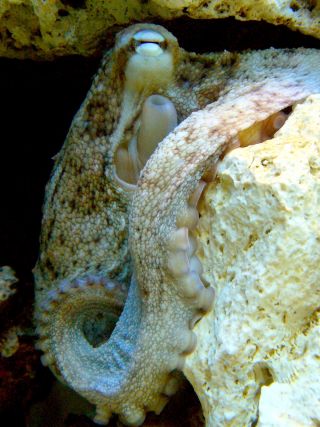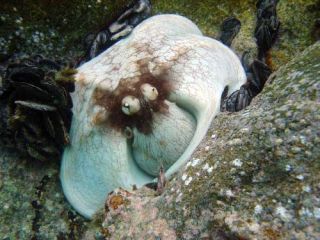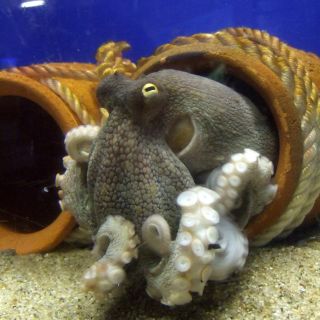Neuroscience
What Is It Like to Be an Octopus?
These smart and sophisticated creatures inhabit a truly alien sensory world
Posted October 14, 2012
Octopuses, along with their cephalopod cousins squids and cuttlefish, are considered to be some of the most intelligent invertebrates out there. They have large brains and are able to quickly master a variety of laboratory tests involving sensory learning and memory.
The common octopus, Octopus vulgaris. Photo by H. Zell.

The common octopus, Octopus vulgaris. Photo by H. Zell.
But because they lack a rigid structure, it was believed that the octopus' central nervous system had only limited control over their limbs. Though they were superstars at many laboratory tests of intelligence, octopuses stymied researchers by consistently failing in tasks that required them to combine central nervous system reward information with visual and peripheral knowledge of the location of their arms.
How can researchers attempt to understand and decipher the behaviors and abilities of the octopus? Dr. Michael Kuba, a researcher at the Hebrew University at the Silberman Institute of Life Sciences, is trying to do just that. In August he presented his work with co-authors Tamar Gutnick and Binyamin Hochner at the International Congress for Neuroethology in College Park, Maryland.
Kuba, Gutnick, and Hochner developed a three-choice, transparent plexiglass maze that required the octopus to use a single arm and direct it to a visually marked compartment outside of its tank. Their results show, for the first time, that the octopus is capable of guiding a single arm in a complex movement to a location. These results suggest octopuses can combine peripheral arm location information with visual input to control goal-directed movements.
I asked Michael Kuba about his research on these "unusually embodied" animals and what makes octopuses so fascinating to work with.
The title of your poster was "Meeting an Alien: Behavioral Experiments on the Octopus." What makes an octopus such an alien being?
Michael Kuba: Octopuses are different as they possess a soft, flexible body that does not have any obvious reference points like we – or any other articulated animal – have. Of course, worms have the same properties of their bodies, only they are not as mobile and active as an octopus is. Octopuses and other cephalopods also have the most complex nervous systems of any mollusks. They have a unique advanced visual system analogous to that of most vertebrates. Living in a sensory world very different from our own, octopuses provide a challenge and inspiration for generations of researchers.
How did you become interested in octopus behavior to begin with?
Photo by Caroline Rogers, U.S. Geological Survey Kuba: 

Photo by Caroline Rogers, U.S. Geological Survey
Kuba:
Describe the modified Y maze you developed. Why did you design this new task especially for an octopus, and what did you hope to learn from it?
Kuba: For many years research on octopuses has focused on simple learning tests, relying on the animals' innate attack response. In combination with surgical lesion experiments, researchers were able to identify some of the most important neural pathways in the octopus nervous system. But a very important question remained unanswered – to what extent and how does this soft bodied animal control its body, and specifically, its arms?
Using a modification of Y shaped mazes we investigated if octopuses posses more control of their bodies than previously thought. (Watch an excellent video abstract from the research team demonstrating the maze above). We developed several different mazes that all have two features in common: they can be used in the octopuses' hometank and they try to deal with questions of body awareness and or motor control. The maze shape, a narrow central tube opening into three choice compartments, was based on the natural probing movement that octopus arms often perform when exploring and hunting in small crevices and under rocks. The Y maze that is mounted on the front glass of the tank allows us to observe the suckers up close while they perform several tasks like exploring or retrieving objects.
In order to reach the food reward, octopuses had to reach a single arm through the tube, out of the water, and into the water of the goal compartment. The goal compartment contained a small food reward and was marked with a black disk.
How did the octopuses perform on this task? Did you see individual differences in different octopuses? Can you compare their learning to that of other animals?
Kuba: Our findings show that octopuses are capable of remembering and repeating a series of motor actions that lead them to a desired goal. In order to complete the task, animals identified the target, associated it with a positive reward, positioned themselves with a clear view of the target, inserted the arm into the central tube, and attempted to guide their arm toward the goal compartment.

Performance was very different on an individual level. The main problem was that we had some animals that were “overenthusiastic:" these animals took much longer than the others, which approached the maze in a more timid way. In the end, all but one of the seven octopuses tested reached the criterion for learning the task, which was five correct trials in a row. The six successful octopuses took between 61 and 211 trials to reach that criterion, and five of those were able to successfully complete this task in less than 90 trials.
What specific directions do you think your research might or should go from here? Can we learn what it is like to be an octopus?
Kuba: Well, I hope we will get closer to this step by step. I think that the big challenge will be to design and conduct experiments that will help us understand the sensory world an octopus lives in. Of course, this is far easier said than done. The plan is to continue to use series of mazes or other contraptions that force the octopus to use certain senses (either exclusively or together with others) to solve specific tasks. I want to continue along the line of body awareness and motor control – that is certain. I would also like to go back to my post doc topic and try new techniques to be able to get recordings from behaving animals.
Related Links:
Octopus vulgaris Uses Visual Information to Determine the Location of Its Arm




